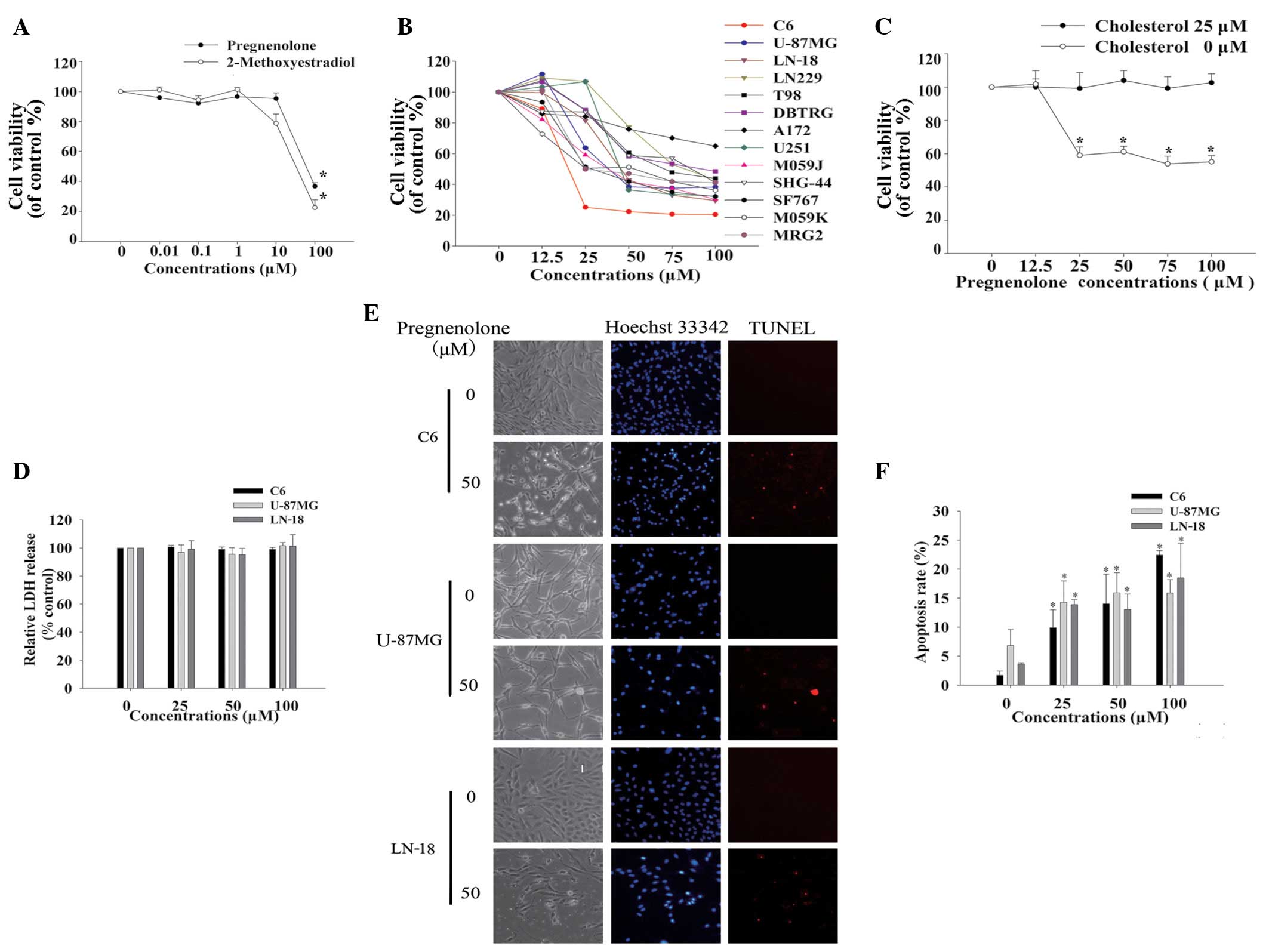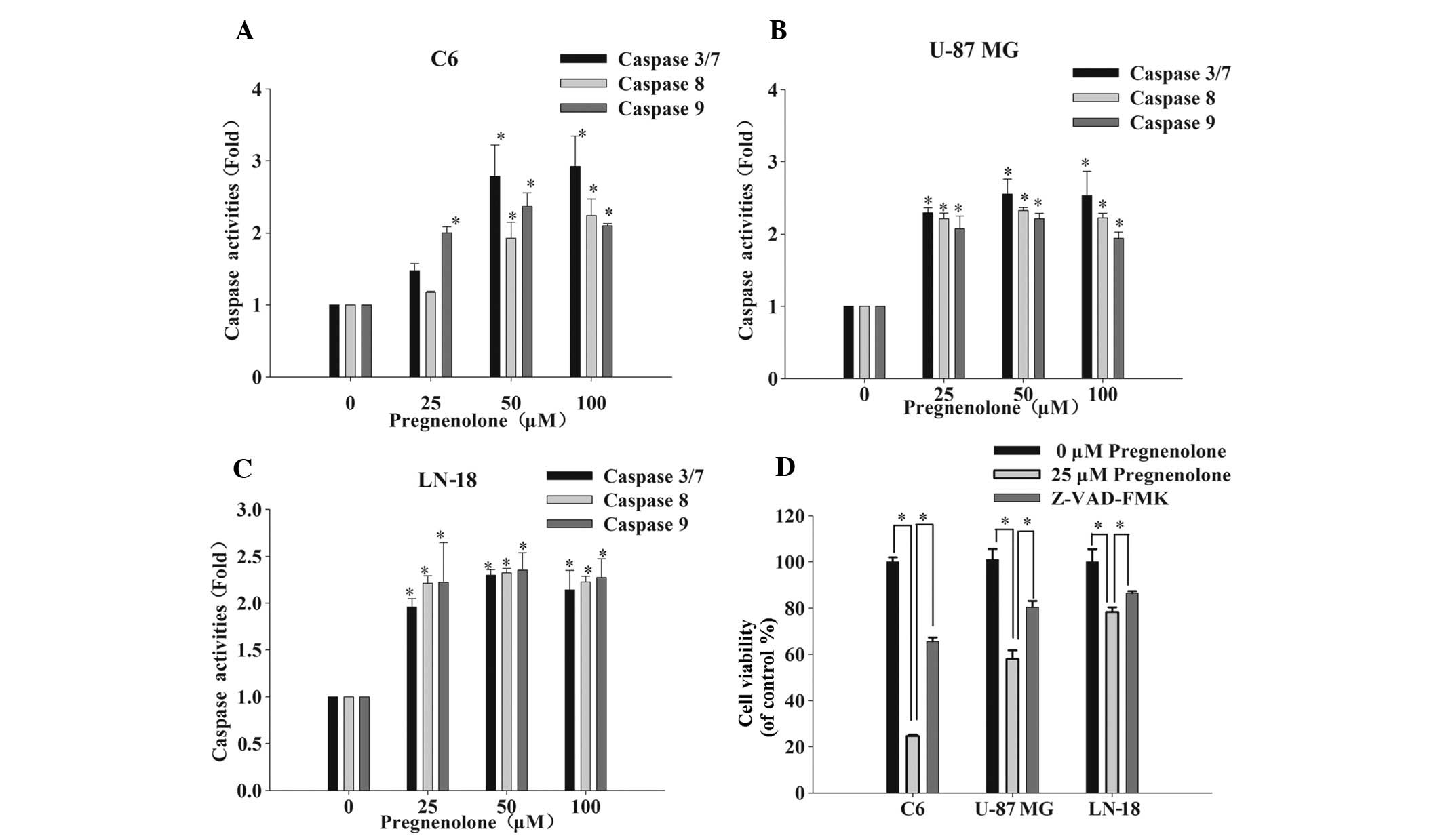|
1
|
Dolecek TA, Propp JM, Stroup NE and
Kruchko C: CBTRUS statistical report: primary brain and central
nervous system tumors diagnosed in the United States in 2005–2009.
Neuro Oncol. 14(Suppl 5): v1–v49. 2012.
|
|
2
|
Louis DN, Ohgaki H, Wiestler OD, et al:
The 2007 WHO classification of tumours of the central nervous
system. Acta Neuropathol. 114:97–109. 2007.
|
|
3
|
Yan H, Parsons DW, Jin G, et al: IDH1 and
IDH2 mutations in gliomas. N Engl J Med. 360:765–773. 2009.
|
|
4
|
Rousseau A, Mokhtari K and Duyckaerts C:
The 2007 WHO classification of tumors of the central nervous system
- what has changed? Curr Opin Neurol. 21:720–727. 2008.
|
|
5
|
Mutter N and Stupp R: Temozolomide: a
milestone in neuro-oncology and beyond? Expert Rev Anticancer Ther.
6:1187–1204. 2006.
|
|
6
|
Chamberlain MC: Temozolomide: therapeutic
limitations in the treatment of adult high-grade gliomas. Expert
Rev Neurother. 10:1537–1544. 2010.
|
|
7
|
Stupp R, Mason WP, van den Bent MJ, et al:
Radiotherapy plus concomitant and adjuvant temozolomide for
glioblastoma. N Engl J Med. 352:987–996. 2005.
|
|
8
|
Wirth T, Samaranayake H, Pikkarainen J,
Määttä AM and Ylä-Herttuala S: Clinical trials for glioblastoma
multiforme using adenoviral vectors. Curr Opin Mol Ther.
11:485–492. 2009.
|
|
9
|
Gorski J and Gannon F: Current models of
steroid hormone action: a critique. Annu Rev Physiol. 38:425–450.
1976.
|
|
10
|
Stocco DM: StAR protein and the regulation
of steroid hormone biosynthesis. Annu Rev Physiol. 63:193–213.
2001.
|
|
11
|
Falkenstein E, Tillmann HC, Christ M,
Feuring M and Wehling M: Multiple actions of steroid hormones - A
focus on rapid, nongenomic effects. Pharmacol Rev. 52:513–555.
2000.
|
|
12
|
Rupprecht R: The
neuropsychopharmacological potential of neuroactive steroids. J
Psychiatr Res. 31:297–314. 1997.
|
|
13
|
LaVallee TM, Zhan XH, Johnson MS, et al:
2-methoxyestradiol up-regulates death receptor 5 and induces
apoptosis through activation of the extrinsic pathway. Cancer Res.
63:468–475. 2003.
|
|
14
|
LaVallee TM, Zhang XGH, Herbstritt CJ,
Kough EC, Green SJ and Pribluda VS: 2-methoxyestradiol inhibits
proliferation and induces apoptosis independently of estrogen
receptors alpha and beta. Cancer Res. 62:3691–3697. 2002.
|
|
15
|
Lin HL, Liu TY, Wu CW and Chi CW:
2-Methoxyestradiol-induced caspase-3 activation and apoptosis
occurs through G(2)/M arrest dependent and independent pathways in
gastric carcinoma cells. Cancer. 92:500–509. 2001.
|
|
16
|
Kirches E and Warich-Kirches M:
2-methoxyestradiol as a potential cytostatic drug in gliomas?
Anticancer Agents Med Chem. 9:55–65. 2009.
|
|
17
|
Tang YC, Williams BR, Siegel JJ and Amon
A: Identification of aneuploidy-selective antiproliferation
compounds. Cell. 144:499–512. 2011.
|
|
18
|
Fulda S and Debatin KM: Extrinsic versus
intrinsic apoptosis pathways in anticancer chemotherapy. Oncogene.
25:4798–4811. 2006.
|
|
19
|
Chandrasekar B, Vemula K, Surabhi RM, et
al: Activation of intrinsic and extrinsic proapoptotic signaling
pathways in interleukin-18-mediated human cardiac endothelial cell
death. J Biol Chem. 279:20221–20233. 2004.
|
|
20
|
Johnstone RW, Frew AJ and Smyth MJ: The
TRAIL apoptotic pathway in cancer onset, progression and therapy.
Nat Rev Cancer. 8:782–798. 2008.
|
|
21
|
Degterev A, Boyce M and Yuan J: A decade
of caspases. Oncogene. 22:8543–8567. 2003.
|
|
22
|
Dubrovsky BO: Steroids, neuroactive
steroids and neurosteroids in psychopathology. Prog
Neuropsychopharmacol Biol Psychiatry. 29:169–192. 2005.
|
|
23
|
Mellon SH and Griffin LD: Neurosteroids:
biochemistry and clinical significance. Trends Endocrinol Metab.
13:35–43. 2002.
|
|
24
|
Marx CE, Bradford DW, Hamer RM, et al:
Pregnenolone as a novel therapeutic candidate in schizophrenia:
emerging preclinical and clinical evidence. Neuroscience.
191:78–90. 2011.
|
|
25
|
Tsutsui K, Matsunaga M and Ukena K:
Biosynthesis and biological actions of neurosteroids in the avian
brain. Avian Poultry Biol Rev. 14:63–78. 2003.
|
|
26
|
Lacroix C, Fiet J, Benais JP, et al:
Simultaneous radioimmunoassay of progesterone, androst-4-enedione,
pregnenolone, dehydroepiandrosterone and 17-hydroxyprogesterone in
specific regions of human brain. J Steroid Biochem. 28:317–325.
1987.
|
|
27
|
Liu S, Ishikawa H, Li FJ, et al:
Dehydroepiandrosterone can inhibit the proliferation of myeloma
cells and the interleukin-6 production of bone marrow mononuclear
cells from patients with myeloma. Cancer Res. 65:2269–2276.
2005.
|
|
28
|
Ishimaru C, Yonezawa Y, Kuriyama I,
Nishida M, Yoshida H and Mizushina Y: Inhibitory effects of
cholesterol derivatives on DNA polymerase and topoisomerase
activities, and human cancer cell growth. Lipids. 43:373–382.
2008.
|
|
29
|
Girón RA, Montaño LF, Escobar ML and
López-Marure R: Dehydroepiandrosterone inhibits the proliferation
and induces the death of HPV-positive and HPV-negative cervical
cancer cells through an androgen- and estrogen-receptor independent
mechanism. FEBS J. 276:5598–5609. 2009.
|
|
30
|
Simons K and Ikonen E: How cells handle
cholesterol. Science. 290:1721–1726. 2000.
|
|
31
|
Lingwood D and Simons K: Lipid rafts as a
membrane-organizing principle. Science. 327:46–50. 2010.
|
|
32
|
Anderson RG and Jacobson K: A role for
lipid shells in targeting proteins to caveolae, rafts, and other
lipid domains. Science. 296:1821–1825. 2002.
|
|
33
|
Zhuang L, Kim J, Adam RM, Solomon KR and
Freeman MR: Cholesterol targeting alters lipid raft composition and
cell survival in prostate cancer cells and xenografts. J Clin
Invest. 115:959–968. 2005.
|
|
34
|
Shieh PC, Tsao CW, Li JS, et al: Role of
pituitary adenylate cyclase-activating polypeptide (PACAP) in the
action of ginsenoside Rh2 against beta-amyloid-induced inhibition
of rat brain astrocytes. Neurosci Lett. 434:1–5. 2008.
|
|
35
|
Yi JS, Choo HJ, Cho BR, et al: Ginsenoside
Rh2 induces ligand-independent Fas activation via lipid raft
disruption. Biochem Biophys Res Commun. 385:154–159. 2009.
|
|
36
|
Jansen M, Pietiaïnen VM, Pölönen H, et al:
Cholesterol substitution increases the structural heterogeneity of
caveolae. J Biol Chem. 283:14610–14618. 2008.
|
|
37
|
Patra SK: Dissecting lipid raft
facilitated cell signaling pathways in cancer. Biochim Biophys
Acta. 1785:182–206. 2008.
|


















